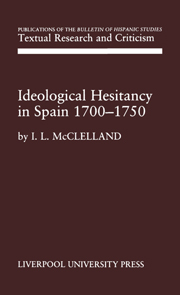Book contents
- Frontmatter
- Contents
- Dedication
- Preface
- CHAPTER 1 Reason of Unreason in the Spanish Vulgo
- CHAPTER 2 The False Alarm of ‘Scepticism’
- CHAPTER 3 The Vulgo-Conception of Scientific Evidence
- CHAPTER 4 The Psychological Significance of Pulpit Oratory
- CHAPTER 5 Witness of the Popular Stage
- CHAPTER 6 The Disturbing Effects of the Periodical Press
- Index
CHAPTER 3 - The Vulgo-Conception of Scientific Evidence
- Frontmatter
- Contents
- Dedication
- Preface
- CHAPTER 1 Reason of Unreason in the Spanish Vulgo
- CHAPTER 2 The False Alarm of ‘Scepticism’
- CHAPTER 3 The Vulgo-Conception of Scientific Evidence
- CHAPTER 4 The Psychological Significance of Pulpit Oratory
- CHAPTER 5 Witness of the Popular Stage
- CHAPTER 6 The Disturbing Effects of the Periodical Press
- Index
Summary
General Science
Ironies of terminological misunderstanding in the fallow mind of the century were not confined to definitions of the word ‘sceptic’. Fallowness, by its very state of multiple receptivity, is open to a confusion of ideas. Certain other terms which became liable to misinterpretation in current usage and which soured debate were, for instance, ones referring to the nature of scientific evidence. Among notably misleading adjectives paraded with theatrical confidence by the folk-scientist Torres Villarroel and his peers were ‘demonstrable’, ‘practical’ and ‘experimental’. They were words used to indicate conclusively physical proof as obtained through normal operations of human senses which had generally been regarded as the ultimate means of testing phenomena. Subjective conceptions of demonstrable evidence were part of a mind-pattern created by the needs of those who tried to contribute to fashionably modern logic by combining certain selected principles of old philosophy with selected principles of new rationalism. It was a pattern shaping itself in many scientific disciplines, including Medicine and the related ‘Astrological Astronomy’, which in the variety of its implications greatly contributes to our understanding of the troubled vulgo-mind. For this reason of technique, and of the authors' potentialities for change, and not because of the intrinsic value of typical expressions of philosophical compromise, it is helpful to follow in different disciplines some of the arguments concerned.
- Type
- Chapter
- Information
- Ideological Hesitancy in Spain 1700-1750 , pp. 58 - 85Publisher: Liverpool University PressPrint publication year: 1991

